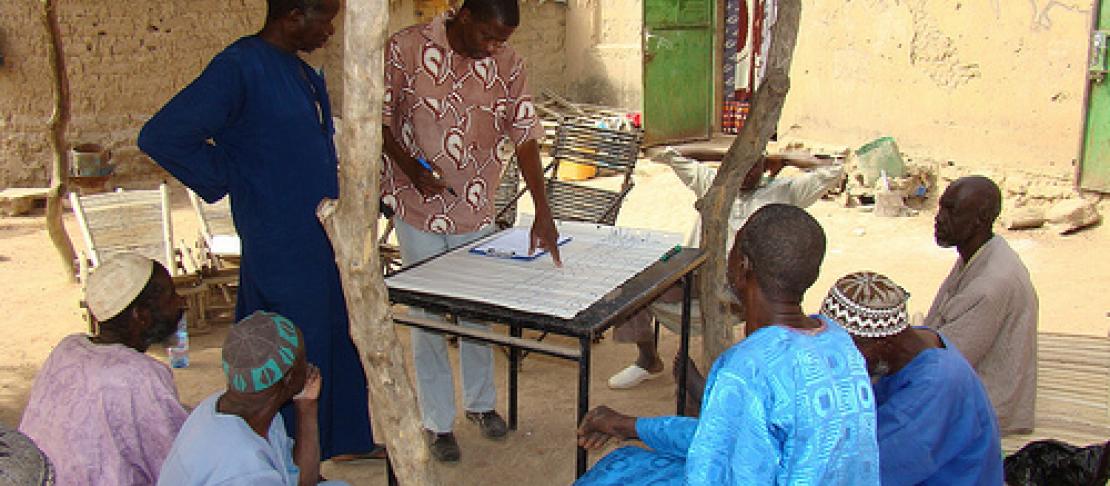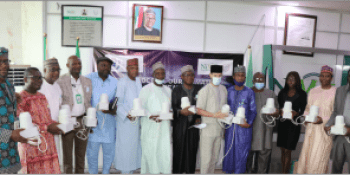New project looks to bring weather information to farmers in the Sahel

In a harsh and unpredictable environment, reliable weather information is crucial for farmers to successfully grow their crops. By studying a successful weather information program in Mali, climate adaptation researchers and agencies are hoping to learn how to best deploy similar programs in the region, to help reduce the risks faced by smallholder farmers.
Highlighted by the CGIAR Research Program on Climate Change, Agriculture and Food Security (CCAFS) in November, the Mali Meteorological Program has since 1982 shared weather information with over 2500 farmers. As a result, farmers are reporting increased yields and willingness to invest in new technologies.
CCAFS, together with the United States Agency for International Development (USAID), the International Research Institute for Climate and Society (IRI), the Institute for Rural Economy of Mali (IER) and sub-regional partners (AGRHYMET) recently engaged in a three-day training workshop on the assessment methodology of the Mali Meteorological Program.
The Mali meeting kicked off the next few months of survey work; a team will be speaking to the people involved in the project to discover the keys to its success and how similar initiatives could potentially be implemented elsewhere.
Reliable weather information is crucial for food security
According to workshop leader Dr. Robert Zougmoré, this type of project is vital for farmers living in the Sahel area, where extreme weather and climate events could be detrimental to agricultural production.
“The problem is that there is a huge gap between the farmers' immediate needs and the available information and services provided,” he said. “This is why it is important to look into the possibility of taking this successful, pioneering meteorological project and scale it up in the whole Sahel region, so that more farmers could benefit.” Dr. Zougmoré leads the CCAFS West Africa Regional Program.
Watch Dr Robert Zougmoré below talk about coping with climate variability and change in West Africa:
According to a 2011 assessment by the World Resources institute (PDF) the Mali meteorological climate project was the first to reach the farmers directly with necessary information, and taught farmers to measure climatic variables themselves and develop the skills necessary to use climate-related information in agricultural decision-making. There are therefore a lot of knowledge and lessons to be learnt from the project that could be used to develop similar initiatives in other regions.
What needs to be done to scale up?
Mali’s climate information initiative has made several improvements in the life of the farmers, said Mr Daouda Zan Diarra from Mali’s national meteorological service (direction nationale de la météorologie or DNM). However, a comprehensive documentation of the facts and reasons for success and major scientific and institutional constraints encountered need to be worked out if this successful initiative is to be scaled up.
Identifying the project’s benefits to participants, how participants received the benefits, and any gaps and needs for large adoption of the project’s products in Mali will constitute a “good enough” output that identify clear points and pathways of impact of this project.
Dr. Robert Zougmoré highlighted the three main components of the upcoming survey:
- The field assessment, which aims to collect information from participants and non-participants through focus group discussions and individual interviews;
- The institutional assessment which will consist in interviews of project participating agencies and institutions, review of existing data, documents, and records to identify how project has been implemented and methods used;
- The science assessment, aiming to define gaps in all scientific aspects of the project and analyze them in the perspective of providing up-to-date scientific tools, methods and information that will be relevant for sound up-scaling-up of the advisory mechanism.
The survey will run from February to May 2012. CCAFS will present the results here on the blog.
Read more about our research on Adaptation through Managing Climate risks.
This blog story was written by Abdoulaye Moussa, Science Officer West Africa and Cecilia Schubert, Communications Assistant at CCAFS.


